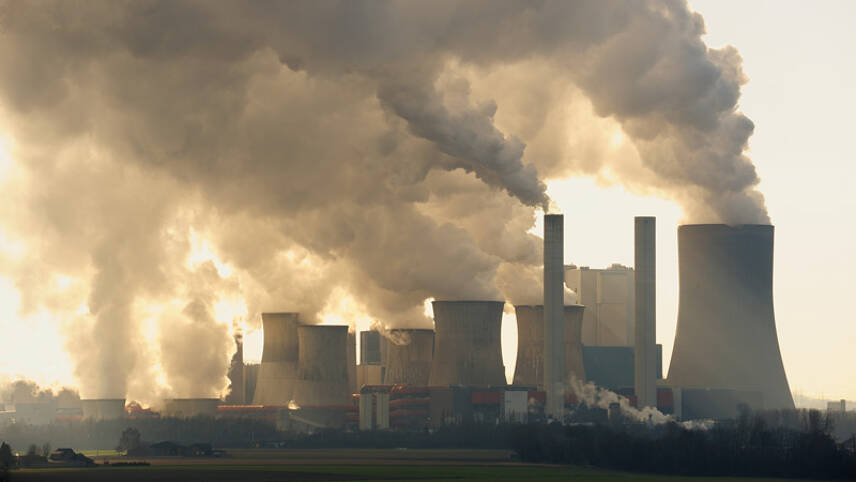Register for free and continue reading
Join our growing army of changemakers and get unlimited access to our premium content

Pictured: Coal-fired power generation in North Rhine-Westphalia, Germany
The stocktake confirms, as the UN has done before, that the world is on track to warm beyond the trajectories set out under the Paris Agreement in 2015. These are 2C and 1.5C.
Beyond these trajectories, climate scientists have stated, cascading risks will likely crystallize rendering parts of the planet currently hosting billions ‘unliveable’. Island nations in the Global South have repeatedly called any exceeding of 1.5C a death sentence.
The UN has warned that levels of progress so far will need to be majorly accelerated if the Paris Agreement is to be delivered. It has called for “deep and immediate emission cuts across all sectors and regions”.
There needs to be at least a 43% reduction in annual global emissions by 2030 to keep 1.5C alive.
No nations are named in the global stocktake report directly so, for now, we are not able to see what the UN makes of individual countries’ plans for delivering their fair share of the Paris Agreement.
Energy transition
Particularly “radical decarbonisation”, the stocktake states, is needed in the energy system. It implores policymakers not to seek ways around rapidly phasing fossil fuels down and out, such as replacing coal for gas or betting on man-made carbon capture.
The International Energy Agency (IEA)warned late last year that power sector emissions are likely to keep climbing through to 2025 following a temporary dip during Covid-19 lockdowns. The Agency subsequently confirmed that 2022 marked a global record for coal consumption, despite pledges to reduce the use of the world’s dirtiest fossil fuel.Coal consumption will need to decrease by up to 82% by 2050 per the UN’s calculations.
Responding to the report, COP28 President-Designate Dr Sultan Al Jaber said: “We need to rapidly decarbonise both the supply side and demand side of the energy system at the same time. We need to triple renewable energy by 2030, commercialize other zero-carbon solutions like hydrogen and scale up the energy system free of all unabated fossil fuels, while we eliminate the emissions of the energies we use today.”
The United Arab Emirates (UAE) has been rapped by the UN for advocating, during previous international climate summits, for solutions that would enable oil and gas-producing nations to bypass transitioning their energy generation systems by investing in nascent carbon capture.
Its COP28 team had previously stated that, this year, it would lead efforts to strengthen agreements on reducing fossil fuels for good. But the statement above does emphasise abatement and the elimination of emissions, rather than eliminating all fossil fuels.
All change
Beyond the energy transition, the UN global stocktake emphasises the importance of equally rapid and drastic changes to transport systems and global systems of food production and land use.
On transport, the conclusion is that electric vehicles “offer the greatest mitigation potential”. But there cannot be a replacement of existing cars and vans 1:1 – public and active transport provisions in towns and cities globally need to be improved. There also needs to be a decarbonisation of public transport between towns, cities and villages. Vehicle sharing markets will also need to grow.
On food production and land use, the report highlights the fact that food production is a major driver of deforestation, nature degradation and unsustainable water management. This is particularly prevalent in intensive livestock production and the production of feed for animals and fish. The stocktake also sets out the need for the more sustainable production of key crops, plus increased investments to make these crops resilient against future climate change.
Food waste action is another significant lever to keeping 1.5C alive. 30-40% of all food produced each year goes to waste, and this waste comes with a significant carbon footprint. WRAP estimates that food waste accounts for some 8% of global annual emissions.
Just Transition
Crucially, the new UN stocktake concludes that “there are now sufficient cost-effective opportunities” to keep the Paris Agreement alive. The technologies and finance needed to solve the crisis do exist, but the “window of opportunity” to implement them is “rapidly closing” and political disagreements on delivery remain.
The report highlights how a failure to act will be far more costly than massively scaling investment in decarbonisation, food systems change and adaptation in the near-term and mid-term.
Also covered is the fact that, while “rapid change can be disruptive”, well-designed climate policies can ultimately help to lift people out of poverty through access to well-paid green jobs and the provision of affordable, low-carbon services like public transport and energy. The report challenges the notion that the transition should be avoided for the sake of the average worker.
The scale of the effort needed is not taken lightly. The stocktake states that “efforts must be sustained over decades” and will require a complete overhaul to business-as-usual, including global financial systems and the ways that nations cooperate on green policymaking.
Nations must, as a starting point, “integrate climate change risks into all aspects of planning, decision-making and implementation”. They must also implement more “rigorous” requirements for corporations to disclose their emissions and set out science-based plans to reduce them.
The UN is notably hosting a Climate Action Summit in New York later this month. Nations have been asked to present “credible, serious and new plans”. Current policy commitments are estimated to be aligned with 2.4C – 2.8C of warming if delivered in full, and the UN has expressed concern about the gap between ambition and action since the Paris Agreement was ratified in 2015.


Please login or Register to leave a comment.